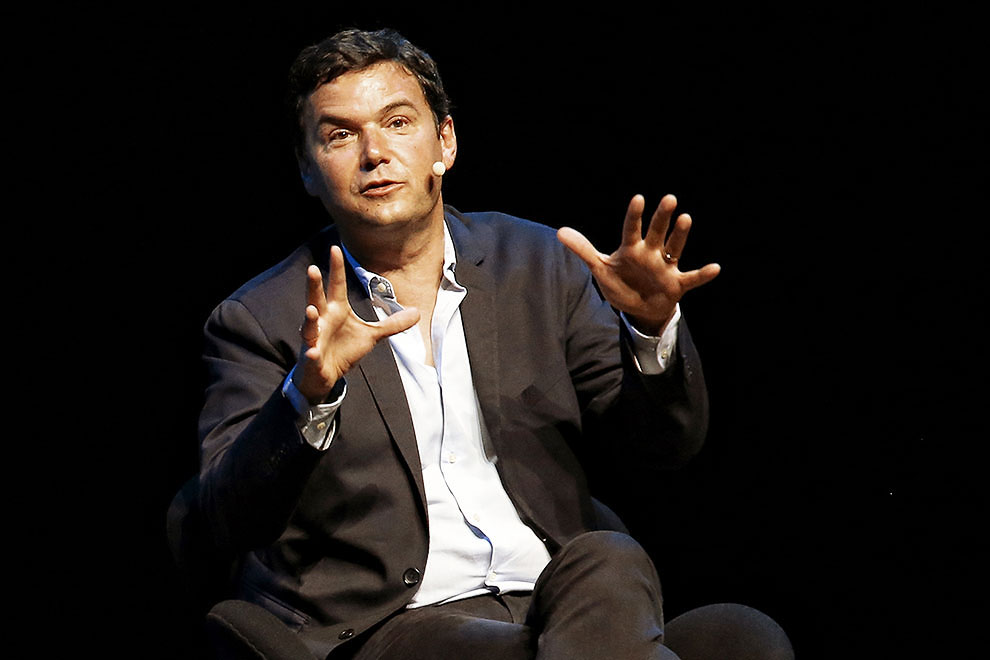What would persuade two-and-a-half thousand people to flock to the Opera House concert hall for a lecture delivered in heavily accented English by a French economist whose speciality is historical statistics? Thomas Piketty has a light charm and an easy manner, but he is no rock-star charismatic like his Greek counterpart Yanis Varoufakis (who is one of his sternest critics). Nor is he an overt polemicist like Paul Krugman or Joseph Stiglitz. He is not the kind of speaker who can stir an audience through moods of hilarity and consensual outrage.
Sunday afternoon’s session, which sold out weeks in advance, was expertly chaired by Andrew Leigh, shadow assistant treasurer and former professor of economics at the ANU, who has called Piketty “one of the greatest data-crunchers the world has ever known.” They have a common mentor in Tony Atkinson, éminence grise of the London School of Economics, who inspired both of them to work in the area of economic inequality: Piketty as a specialist in historical data on taxation and population, Leigh with a focus on Australia and New Zealand. They have their points of difference, but neither has an antagonistic style. Piketty, as Leigh said in his introduction, is “a very nice man.” The mood was accordingly relaxed and genial and Piketty, apparently unfazed by that vast sea of people or the symbolic grandeur of the venue, delivered his lecture with quiet precision, exactly as if he were addressing a couple of hundred students.
The unlikely mass appeal of this occasion is an extension of the vast and perhaps even more unaccountable appeal of his bestselling book Capital in the Twenty-First Century, a theoretical juggernaut that topped Amazon’s bestseller list soon after the release of its English translation in 2014. Although Kindle tracking suggests that most people don’t read more than a couple of dozen pages, the impulse to buy it continues to burn, with sales now approaching the two million mark. That two million people even think they need to read it, and that two-and-a-half thousand will come out on a sunny Sunday afternoon to hear an exposition of its key points, says something. But what?
As an accompaniment to the scholarly disquisitions he pursues as a leading academic economist, Piketty also writes overtly left-wing political commentaries for the French press, some of which are published in a recent collection, Chronicles. But he is no twenty-first-century equivalent of Karl Marx. Nor, in spite of the provocatively chosen title of his magnum opus, is he trying to be. If there is a groundswell of people looking for an economic revolution, he’s not the man to lead it.
With his high-order skills as a mathematician and an exhaustive armoury of statistical data, Piketty assembles a thesis about the behaviour – or misbehaviour – of capital in the twenty-first century. It may be unusual to describe a thesis as an assemblage, but that is very much how his critics have seen it. The data-first approach leads him to extrapolate three “fundamental laws” of capitalism. These are essentially a set of equations to express the correlations between capital stock, capital income and national income. The third and most controversial of these laws – Piketty’s “central contradiction of capitalism” – is that the rate of return on capital is higher than the growth rate of the national income, with the consequence that the rich go on getting richer in a feedback loop of escalating returns. He argues that inequality harms growth and is a major source of political instability.
A public lecture affords limited scope for spelling out the logical underpinnings of the theory, but Piketty didn’t fight shy of exposing his audience to some of the intricacies involved in getting a reliable picture of macroeconomic tendencies. He focused on a critique of the Kuznets curve, one of the primary theoretical supports for the notion of trickle-down economics. Originally put forward by American economist Simon Kuznets in 1954, it assumes that income inequality follows the development process as an inverse U-shape, rising with the initial impact of industrialisation on the labour force, then declining as workers caught up with technological advance, becoming more skilled and consequently better rewarded. By the beginning of the twenty-first century, when Piketty began to write about it, the curve was doubling back on itself. Economists readily interpreted it as a repeat pattern, reflecting the effects of the technological revolution. Piketty was sceptical.
Using an expanded range of data, stretching further back in history and across poorer countries as well as the developed world, he found that the implications were very different, and the pattern was the inverse of the Kuznets curve. Piketty’s analysis challenges the trickle-down assumption, suggesting that the narrowing of inequality across the mid twentieth century was instead the consequence of “major shocks” – wars, revolutions and other turbulent events – that hurt the fortunes of the wealthy. Rises in progressive taxation in the decades following the first and second world wars also kept the cap on those at the top of the rich list.
Piketty is a fan of progressive taxation. There is no evidence, he says, that it puts a brake on growth, and cutting it back can have serious long-term consequences for national income. He argues for a global wealth tax, and for punitive measures against tax havens, and is fierce about the iniquities of huge bonuses paid to executives who make no demonstrative contribution in terms of innovation or increased productivity. His data suggests that larger capital investments bring higher returns, so that the wealth of the top 1 per cent increases four or five times as fast as the average income.
On stage at the Opera House, Piketty allowed himself some touches of polemic. Meritocracy is largely a myth invented by the winners of the system. Trickle-down economics is a fairytale. Without any policy constraints on the behaviour of capital, the past will be eating the future. Was Scott Morrison listening to this? Or Malcolm Turnbull, who is prone to giving Economics 101 tutorials in question time?
In relation to Australia, though, Piketty is circumspect. In interviews, all he has been prepared to say explicitly is that we should introduce an inheritance tax. Ours is currently zero per cent – “which is very little,” he quips – compared to the rates of over 40 per cent in Japan, Germany and Britain. On Lateline on Monday night, he was almost evasive in response to Emma Alberici’s question about the current government’s claim that $50 billion in tax cuts would be repaid four times over in jobs and growth. “This kind of discourse…” Piketty said, “I have heard it before. It’s a little bit exaggerated.”
The vigorous hand gestures that accompanied this observation didn’t compensate for the understatement, especially since the government, as Alberici stated, recently entered a successful election campaign on the back of this claim. No doubt it is wise for foreign visitors to avoid adopting trenchant positions on our domestic politics, but given the contradiction between the Morrison–Turnbull rhetoric and the substance of Piketty’s analysis, this visitor might have done a bit more straight-talking.
The absence of any occasion for robust debate during his visit is a significant concern. In most of the media interviews, he has been courted as the authoritative voice in contemporary economic thought; and though there were some challenging audience questions in response to the Opera House lecture, the whole occasion conveyed a sense of wisdom being delivered from on high. A shorter lecture followed by a discussion panel would have made for a more dynamic occasion. Leigh’s track record in crunching the numbers on Australian social capital since the mid twentieth century puts him in a position to offer a more cogent account than Piketty of how the inequality graphs may be interpreted here, and we might have learned more if the two of them had been drawn into argument.
Piketty is a controversial figure among economists, and not just those who don’t like the left-wing tendencies of his argument. Varoufakis has slammed the thesis of Capital as a set of “logically incoherent tricks that have allowed mainstream economic theory to disguise grand theoretical failure,” and fears that valid attempts to discredit it will prove counterproductive to the wider cause. I have never heard Piketty respond to this. It seems he avoids the kinds of gladiatorial exchange Varoufakis relishes.
As an academic economist whose credentials are in hardcore technical analysis and data research, Piketty may rightly be wary of too readily translating his findings into partisan opinions. And this may also be part of his appeal to wider audiences, counterintuitive though that may seem. We are used to being preached at by politicians who purport to tell us the inviolable truths and laws of economics, in a political culture that has made “the economy” into the primary and almost sole measure of governmental performance. In this environment of economic fiats and policy imperatives, what is needed is not counter-propaganda but more public understanding of how economic policies work, what consequences they may have, and what the alternatives are. The popularity of Piketty’s work signals a widespread determination to see a genuine change of direction, backed by evidence rather than credo. •




